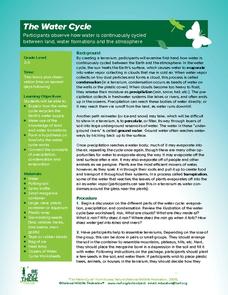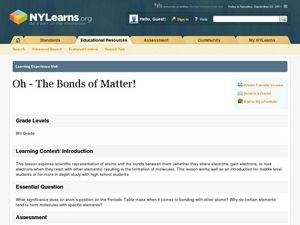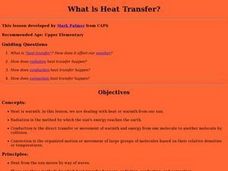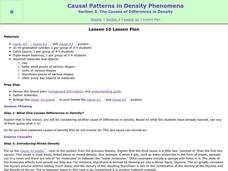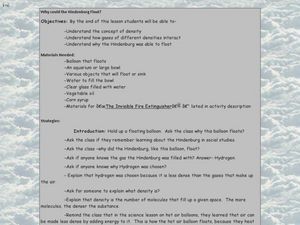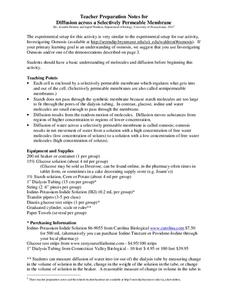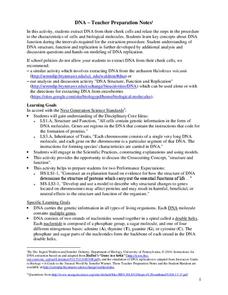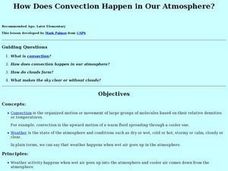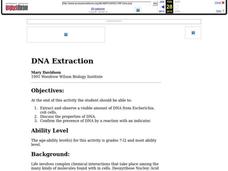Curated OER
Matter Unit
Students create products from studying about matter that include: Make a "T" chart with matter and non matter items. Write a poem, song, or rap about matter. Five vocabulary words from the chapter must be included in the poem.
Curated OER
DNA Replication, Transcription, and Translation
High schoolers apply the rules of complementary base pairing to finding the complementary sequence to a given strand of DNA. After extensive researching, the also find the amino acid sequence encoded by a given strand of DNA.
Curated OER
DNA Fingerprinting with Gel Electrophoresis
High schoolers use DNA fingerprinting to demonstrate the concept that DNA fingerprinting can be used to identify individuals and solve problems. They use gel electrophoresis to analyze the DNA of a suspected criminal to prove innocence...
Curated OER
The Water Cycle
Students are introduced to the components and importance of the water cycle. They are shown how groundwater moves using a model. Students list 9 places on earth where water is found. They define the terms cycle and water cycle.
Curated OER
Oh - The Bonds of Matter!
Eighth graders identify the types of bonds elements form. In this chemistry lesson, 8th graders represent valence electrons with dot structures. They draw and label different atoms.
Curated OER
Snow Science
Learners investigate how efficient different substances are at melting snow. Students collect and analysis data.
Curated OER
How Are The Properties of Covalent Compounds Influenced By Chemical Bonding?
Students work together to observe the bond lengths of single, double and triple bonds. They make their own predictions about the strength of the bonds and chemical reactions. They answer discussion questions to complete the...
Curated OER
The Causes of Differences in Density
Students explore the causes of differences in density. Students choose objects, measure the mass and volume, and calculate the density of each. They perform additional density experiments to model atoms and their correspondence to...
Curated OER
Recognizing and Describing Chemical Changes
Seventh graders distinguish between physical and chemical changes in both natural and technological settings. They identify the reactants and products for a given chemical reaction. they then write simple chemical equations given the...
Curated OER
The Wonderful World of Polymers
Seventh graders investigate the concept of polymers. They discover unique properties and how polymers are natural. The lesson contains sufficient background information for the teacher. Students examine different types of materials and...
Curated OER
How Do You Dew?
Students examine how the processes of condensation and evaporation occur. They describe the relationship between heat energy, evaporation and condensation of water on Earth. They give examples of the processes of evaporation and...
Curated OER
Sunlight and Warm Air
Students discuss radiant energy from the sun, performing a simple experiment with sun glasses and bright light to demonstrate the concept. Students further participate in simple in-class experiments to demonstrate: air density as it...
Curated OER
Modeling Protein Structure
Learners examine amino acids and discuss the properties of side chains. In this proteins lesson students demonstrate the foldings of peptides.
Curated OER
Why Could the Hindenburg Float?
Tenth graders experiment with floating and sinking objects and heavy and light liquids, using correct terms, like density, to explain what happens. In this Hindenburg lesson, 10th graders watch a demonstration called the invisible...
Curated OER
Capillary Action And Transpiration
Students engage in a study of the concepts of biology with plants known as capillary action and transpiration. They conduct a simple experiment to demonstrate the concept. The lesson includes a background discussion led by the teacher...
Curated OER
Diffusion Across a Selectively Permeable Membrane
Learners investigate how water passes through cell membranes. In this biology lesson, students differentiate osmosis and diffusion. They illustrate the movement of water in both processes.
Curated OER
Extracting DNA from Your Cells - Teacher Preparation Notes
Students extract their own DNA from cheek cells. In this biology instructional activity, students explain the replication process. They identify the structure and composition of DNA.
Curated OER
Hot Rocks
Students demonstrate that setting of plaster and cement is a change, which involves a release of heat energy, use data collected experimentally to construct comparison graphs and analyze the graphs to make predictions about future...
Curated OER
DNA Model and Protein Synthesis
Students build a 3-dimensional model of DNA coding for the hormone oxytocin.
Curated OER
How Does Convection Happen in Our Atmosphere?
Pupils explore convection and how it happens in the earth's atmosphere.
Curated OER
Enzymes
Tenth graders observe enzyme activity. They discuss the relationship between drug use and enzyme activity.
Curated OER
Sound All Around Us
Students make predictions about how sound is formed. They view and discuss a video that explores sound formation and attempt to identify the origin of different sounds.
Curated OER
DNA Extraction
Students are able to extract and observe a visible amount of DNA from Escherichia coli cells. They discuss the properties of DNA. Students confirm the presence of DNA by a reaction with an indicator.
Other popular searches
- Atoms and Molecules
- Gumdrop Atoms and Molecules
- Atoms & Molecules
- Compounds and Molecules
- Water Molecules
- Organic Molecules
- Atoms Molecules
- Building Molecules
- Molecules of Life
- Gas Molecules
- Matter and Molecules
- Biological Molecules



